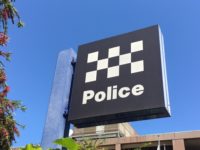When Can Police Arrest a Person, and How Much Force Can be Applied?

Victoria’s Independent Broad-based Anti-corruption Commission (IBAC) is investigating an incident during which police officers broke a man’s neck when they came to his house to tell him to turn his stereo down.
The story of 47-year old Chris Karadaglis is frightening and tragic, yet true.
In November 2017, police knocked on the man’s front door in response to a noise complaint from neighbours. Minutes later, Chris was quadriplegic, paralysed from the neck down.
A noise complaint ends in a broken neck
What happened in between police arriving at Chris’ home to deal with what should have been a minor issue is a blur for Chris. He recalls only the feeling of being wrapped in a headlock, dragged along his lawn. He remembers hearing a loud click and then feeling limp, struggling to breathe. This was the moment his neck was broken.
The next day his family learned the full extent of Chris’ injuries. They were told he would never have the use of his limbs again.
When Chris’ sister Alex approached local police to make a complaint, a senior officer from the South West Victoria Police Command told her that the three attending officers had done nothing wrong. The officer told her this was because the officers had consistent stories.
While in hospital, Chris admitted to police he had been drinking on the night. He said he initially complied with the police direction to turn his music down, and further admitted that he foolishly turned it back up as police were returning to their car.
He said his actions were immature and clearly provoked police, but feels this did not justify them returning and acting violently towards him.
Chris says that while he was being handcuffed on the floor, he felt the tremendous force of officers on top of him, and then the sound of his neck breaking.
Police powers of arrest in NSW
In New South Wales, the power of police to arrest a person without a warrant is contained in section 99 of the Law Enforcement (Powers and Responsibilities) Act 2002 (the LEPRA), which provides that officers can do this where:
- they suspect on reasonable grounds that the person is committing or has committed an offence, and
- they are satisfied that the arrest is reasonably necessary for any one or more of the following reasons:
(i) to stop the person committing or repeating the offence or committing another offence,
(ii) to stop the person fleeing from a police officer or from the location of the offence,
(iii) to enable inquiries to be made to establish the person’s identity if it cannot be readily established or if the police officer suspects on reasonable grounds that identity information provided is false,
(iv) to ensure that the person appears before a court in relation to the offence,
(v) to obtain property in the possession of the person that is connected with the offence,
(vi) to preserve evidence of the offence or prevent the fabrication of evidence,
(vii) to prevent the harassment of, or interference with, any person who may give evidence in relation to the offence,
(viii) to protect the safety or welfare of any person (including the person arrested), or
(ix) because of the nature and seriousness of the offence.
The level of force must be reasonable
Section 231 of the LEPRA stipulates that, ‘[a] police officer… may use such force as is reasonably necessary to make the arrest or to prevent the escape of the person after arrest.’
The force that is considered reasonable depends on all of the circumstances of the particular incident, including:
- The nature and seriousness of any offence that is alleged,
- Whether the suspect is armed and, if so, the nature of the weapon, and
- The actions of the suspect before and during the arrest process.
Force that goes beyond what is reasonably necessary is considered an assault under the law.
Was the force reasonable?
While the nature of the initial conduct of Chris in raising the volume on his stereo can be considered trivial – and there may be an argument that the arrest itself was unlawful – his actions after police returned to his premises is unclear.
It is also unclear whether those actions justified police applying so much force on his body that they broke his neck.
Family complains to police, IBAC steps in
When local police refused to engage Chris’ family in any further discussion after they were told her brother would never walk again, they lodged a formal complaint with the Professional Standards Command, (PSC) and not long after this IBAC launched its own investigation, which is now underway.
This is not standard procedure when complaints about Victorian police are made. Only about 10 percent of complaints are considered serious enough to be passed onto Professional Standards Commmand, and just two percent – the most serious of cases – end up being referred to IBAC.
The rest are taken on by local police – meaning that officers are often left to investigate police themselves – perpetuating a culture in which cover-ups can thrive and brutality and misconduct can remain unchecked.
It is hoped IBAC will get to the bottom of what occurred in Chris’ case.
Incidents of police brutality
Earlier this year, Eathan Cruse was awarded $400,000 after police entered his parents’ home, tied his hands behind his back with cable ties and bashed him repeatedly before slamming him into a fridge. In 2018, six Victorian police officers were caught on CCTV camera assaulting a disabled pensioner and dousing him with capsicum spray. Ex- police woman Yvonne Berry was recently awarded more than $500,000 after she was handcuffed, dragged along the floor of the police station, stripped of her underwear, stomped on and kicked on by former colleagues in a regional police station.
These are just a few of the recent stories that have been made public.
Lack of accountability
It has long been acknowledged that IBAC has limited resources and powers, which means that it cannot take on all cases, and there are questions around its ability to thoroughly investigate those cases it does take on.
The Professional Standards Command is an organisation in crisis too – battling with a perception and credibility problem after a long history of failing to make officer’s truly accountable. It’s former chief, Brett Guerin, was sacked after he was found to have used an online alias to post racist comments using an online alias to post vile racist comments.
Last year a Victorian Parliamentary inquiry echoed what many in the legal sector have been saying for a long time, and that is that the State Government needs to provide these oversight bodies with more funding, and more power – so that officers who do the wrong thing can be called to account.
But there is also a much more pressing problem that urgently needs addressing, and that is the way that police interact with the public. Each and every one of us has the right to feel safe in our dealings with Police. It’s terrifying to think that a man can end up in a wheelchair, his life irrevocably changed after an interaction with police.
This is not a problem isolated to the Victorian police force. All around Australia, police brutality continues at an alarming rate, causing a great rift between police officers and the communities they serve.








